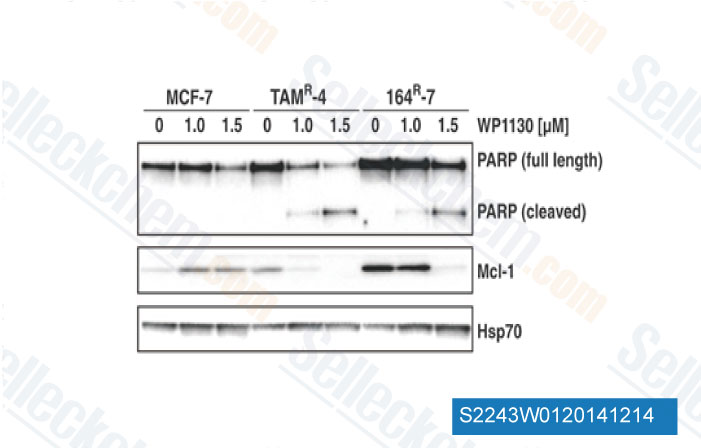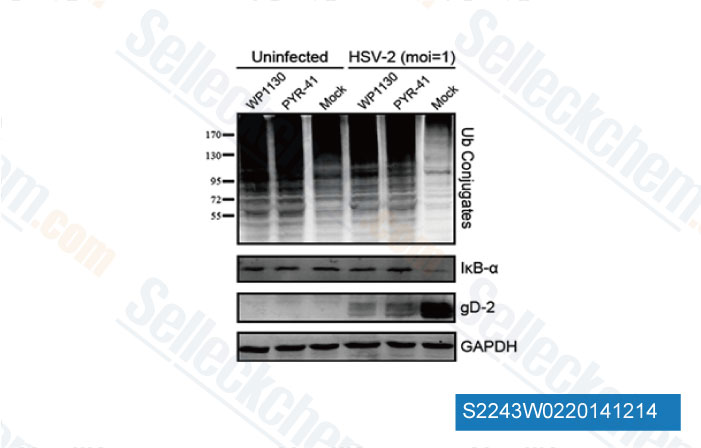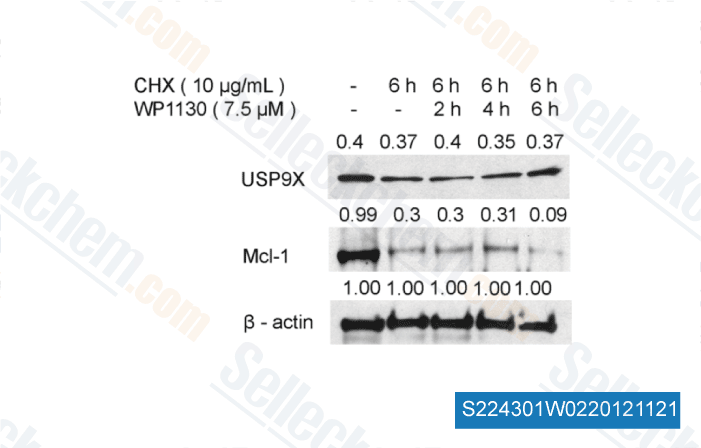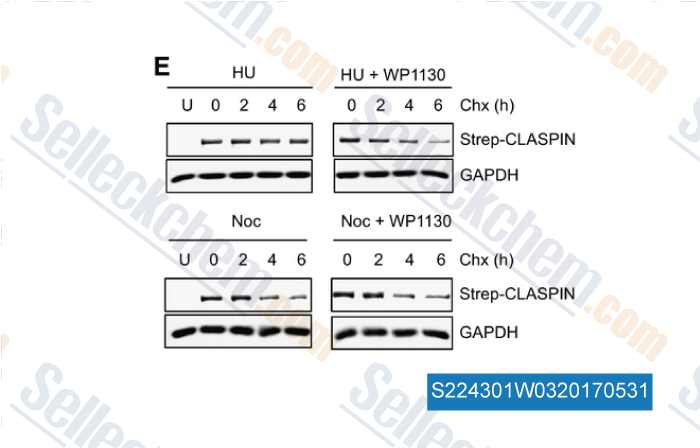|
Toll Free: (877) 796-6397 -- USA and Canada only -- |
Fax: +1-832-582-8590 Orders: +1-832-582-8158 |
Tech Support: +1-832-582-8158 Ext:3 Please provide your Order Number in the email. |
Technical Data
| Formula | C19H18BrN3O |
||||||||||||||
| Molecular Weight | 384.27 | CAS No. | 856243-80-6 | ||||||||||||
| Solubility (25°C)* | In vitro | DMSO | 77 mg/mL (200.37 mM) | ||||||||||||
| Ethanol | 35 mg/mL (91.08 mM) | ||||||||||||||
| Water | Insoluble | ||||||||||||||
| In vivo (Add solvents to the product individually and in order) |
|
||||||||||||||
|
* <1 mg/ml means slightly soluble or insoluble. * Please note that Selleck tests the solubility of all compounds in-house, and the actual solubility may differ slightly from published values. This is normal and is due to slight batch-to-batch variations. * Room temperature shipping (Stability testing shows this product can be shipped without any cooling measures.) |
|||||||||||||||
Preparing Stock Solutions
Biological Activity
| Description | Degrasyn (WP1130) is a selective deubiquitinase (DUB: USP5, UCH-L1, USP9x, USP14, and UCH37) inhibitor and also suppresses Bcr/Abl, also a JAK2 transducer (without affecting 20S proteasome) and activator of transcription (STAT). This compound induces apoptosis and blocks autophagy. | ||||
|---|---|---|---|---|---|
| Targets |
|
||||
| In vitro | In addition to inducing rapid down-regulation of Bcr/Abl without affecting Bcr or c-Abl, Degrasyn (WP1130) also regulates the stability of Jak2 and c-Myc without affecting other kinases (HER1, HER2, c-Kit, FAK, ERK1, ERK2, Akt, Btk, Src and Src-related kinases) or transcription factors (wild-type p53, STAT1, STAT3, STAT5, c-Jun, NF-κB, and Max). Unlike adaphostin, this compound induces down-regulation of Bcr/Abl within 60 minutes. It is more effective in inducing apoptosis of myeloid and lymphoid tumor cells with IC50 of ~0.5-2.5 μM compared with normal CD34+ hematopoietic precursors, dermal fibroblasts, or endothelial cells with IC50 of ~5-10 μM. This chemical (5 μM) specifically and rapidly down-regulates both wild-type and T315I mutant Bcr/Abl protein without affecting bcr/abl gene expression or engaging the proteasomal degradation pathway in chronic myelogenous leukemia (CML) cells, accompanied by induction of apoptosis. It is more effective in reducing leukemic cell colony formation compared with normal progenitor cells, and effective against primary leukemic cells harboring the T315I mutation. [1] This compound induces rapid proteasomal-dependent degradation of c-Myc protein in MM-1 multiple myeloma and other tumor cell lines, correlated with tumor growth inhibition. [2] Unlike AG490, it acts as a partly selective deubiquitinase (DUB) inhibitor to induce a rapid and marked accumulation of polyubiquitinated (K48/K63-linked) proteins into juxtanuclear aggresomes without affecting proteasome activity. This chemical (5 μM) directly inhibits DUB activity of USP9x, USP5, USP14, UCH-L1, and UCH37, but not UCH-L3, resulting in downregulation of antiapoptotic and upregulation of proapoptotic proteins, such as MCL-1 and p53. [3] |
||||
| In vivo | Administration of WP1130 inhibits the growth of K562 tumors as well as both wildtype Bcr/Abl and T315I mutant Bcr/Abl-expressing BaF/3 cells transplanted into nude mice. [1] Consistent with the down-regulation of c-Myc, this compound displays potent inhibitory activity against A375 melanoma tumors established in nude mice. [2] |
||||
| Features | WP1130 has an advantage in that its activity is not inhibited by a variety of Abl kinase mutations, including T315I. |
Protocol (from reference)
| Cell Assay: |
|
|---|---|
| Animal Study: |
|
References
|
Customer Product Validation

-
Data from [ Oncogene , 2014 , 10.1038/onc.2014.351 ]

-
Data from [ J Virol , 2013 , 87(15), 8675-86 ]

-
Data from [ BMC Cancer , 2012 , 12, 541 ]

-
Data from [ , , Cancer Res, 2016, 76(8):2384-93 ]
Selleck's Degrasyn (WP1130) Has Been Cited by 50 Publications
| Anti-proteolytic regulation of KRAS by USP9X/NDRG3 in KRAS-driven cancer development [ Nat Commun, 2025, 16(1):628] | PubMed: 39819877 |
| USP5 stabilizes YTHDF1 to control cancer immune surveillance through mTORC1-mediated phosphorylation [ Nat Commun, 2025, 16(1):1313] | PubMed: 39900921 |
| The deubiquitinase USP24 suppresses ferroptosis in triple-negative breast cancer by stabilizing DHODH protein [ Cell Death Dis, 2025, 16(1):564] | PubMed: 40715045 |
| ACC1 is a dual metabolic-epigenetic regulator of Treg stability and immune tolerance [ Mol Metab, 2025, 94:102111] | PubMed: 39929287 |
| The deubiquitinase inhibitor WP1130 drives nuclear aggregation and reactivation of mutant p53 for selective cancer cell targeting [ FEBS J, 2025, 292(11):2823-2842] | PubMed: 40070163 |
| Mechanisms of MCL-1 Protein Stability Induced by MCL-1 Antagonists in B-Cell Malignancies [ Clin Cancer Res, 2023, 29(2):446-457] | PubMed: 36346691 |
| Mechanisms of MCL-1 Protein Stability Induced by MCL-1 Antagonists in B-Cell Malignancies [ Clin Cancer Res, 2023, 29(2):446-457] | PubMed: 36346691 |
| Ubiquitin-specific peptidase 5 facilitates cancer stem cell-like properties in lung cancer by deubiquitinating β-catenin [ Cancer Cell Int, 2023, 23(1):207] | PubMed: 37726816 |
| Ubiquitin-Specific Proteases as Potential Therapeutic Targets in Bladder Cancer-In Vitro Evaluation of Degrasyn and PR-619 Activity Using Human and Canine Models [ Biomedicines, 2023, 10.3390/biomedicines11030759] | PubMed: 36979739 |
| Ubiquitin-Specific Proteases as Potential Therapeutic Targets in Bladder Cancer-In Vitro Evaluation of Degrasyn and PR-619 Activity Using Human and Canine Models [ Biomedicines, 2023, 11(3)759] | PubMed: 36979739 |
RETURN POLICY
Selleck Chemical’s Unconditional Return Policy ensures a smooth online shopping experience for our customers. If you are in any way unsatisfied with your purchase, you may return any item(s) within 7 days of receiving it. In the event of product quality issues, either protocol related or product related problems, you may return any item(s) within 365 days from the original purchase date. Please follow the instructions below when returning products.
SHIPPING AND STORAGE
Selleck products are transported at room temperature. If you receive the product at room temperature, please rest assured, the Selleck Quality Inspection Department has conducted experiments to verify that the normal temperature placement of one month will not affect the biological activity of powder products. After collecting, please store the product according to the requirements described in the datasheet. Most Selleck products are stable under the recommended conditions.
NOT FOR HUMAN, VETERINARY DIAGNOSTIC OR THERAPEUTIC USE.
